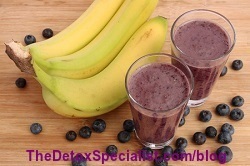 Have you found that green juices or green detox smoothies cause you bloating, pain and/or gas?
Have you found that green juices or green detox smoothies cause you bloating, pain and/or gas?
A leading gastroenterologist in London, England has reported that he’s noticed an increase in patients complaining of irritable bowel which has been caused by juicing and detox smoothies and their excessively healthy diets.
There are on the other hand lots of stories out there from people who have found that their IBS symptoms improved once they started juicing or drinking green smoothies.
So what’s going on here?
Consultant Dr Jonathan Hoare said that SOME people are unable to digest the sugars in fruit and vegetables which hit the gut faster when reduced to a liquid.
In some individuals prone to IBS certain sugars known as FODMAPs are poorly absorbed in the small intestine. When they reach the large intestine, they feed bacteria resulting in bloating, gas, abdominal discomfort, pain and other symptoms associated with IBS.
This does not mean that everyone prone to IBS will find that green juices or smoothies will exacerbate their symptoms.
What are FODMAPs?
FODMAP is an acronym for:
- Fermentable
- Oligosaccharides (Fructans and Galactans)
- Disaccharides (Lactose)
- Monosaccharides (Fructose)
- Polyols (Sorbitol, Mannitol, Maltitol, Xylitol and Isomalt)
FODMAPs are a collection of poorly absorbed, simple and complex sugars that are found in a variety of fruits and vegetables and also in milk and wheat. (another reason to avoid wheat)
Common FODMAPs include:
Fructose: A simple sugar found in many fruits, vegetables and added sugars.
Lactose: A carbohydrate found in dairy products like milk.
Fructans: Found in many foods, including gluten grains like wheat, spelt, rye and barley.
Galactans: Found in large amounts in legumes.
Polyols: Sugar alcohols like xylitol, sorbitol, maltitol and mannitol. They are found in some fruits and vegetables, and often used as sweeteners.
A diet that focuses on Low-FODMAP foods can result in great improvements for people suffering from irritable bowel or other digestive problems.
In fact, according to some research, about 75% of IBS patients can benefit from a low-FODMAP diet
How To Make a Low FODMAP green smoothie or juice.
If you have been getting symptoms of irritable bowel since you have been drinking vegetable juices or green smoothies you could try sticking to low FODMAP fruits and vegetables to see if it helps.
Low FODMAP Fruits: Bananas, blueberries, grapefruit, grapes, kiwi, lemons, lime, mandarins, melons, (except watermelon), oranges, passion fruit, raspberries, strawberries.
Low FODMAP Veggies for green smoothies: spinach, lettuce, Bok choy, kale, endive, alfalfa, bell peppers, bok choy, celery, cucumbers, ginger, chives, radishes, spring onion (only green), tomatoes, parsley, silverbeet,
Avoid honey, agave and any artificial sweeteners. Stevia and pure maple syrup are okay to use in moderation.
It’s better to use as few ingredients as possible and keep your portions small – about 8 oz. Once your gut has settled down you can try to increase the amount you have slowly. No 24 oz smoothies!
How can green smoothies help IBS?
Some people with IBS not affected by FODMAPs may simply need more fiber. The insoluble fibers in leafy greens can help treat both constipation and diarrhea.
When constipation is the problem, this fiber absorbs water and makes the stool easier to expel with less pain. When diarrhea is the problem, the fiber also absorbs water and reduces the liquidness of the stool.
In IBS it is thought that the balance of the microflora is upset, a state known as dysbiosis. Having more “bad” bacteria and less friendly bacteria or bacteria in the wrong place as in SIBO (small intestinal bacterial overgrowth) can contribute to the pain, excess gas, and regularity problems of IBS.
Getting more plant nutrients into your body through juicing and green smoothies may result in a healthier bacterial balance and therefore a better functioning digestive tract.
Greens (especially dandelion greens), bananas and kiwi fruit are especially good for this.
Below are some green smoothie recipes that are made from low FODMAP foods. If green juices or green smoothies have upset your gut in the past then give them a try. But remember that no two people are alike. What may upset one person’s system may be fine for someone else.
Have small amounts to begin with (8oz or less). Do not drink them very cold or iced. It’s best to drink them at room temperature and sip them slowly.
Blue Banana Smoothie 
1 organic banana, peeled and sliced
1/2 cup organic blueberries, washed
2 handfuls of fresh organic baby spinach, washed
4 oz (120 ml) of pure water
Place fruit into your blender first and then add spinach. Add pure water and blend until very smooth.
Citrus Green Smoothie
1 organic orange, peeled
2 handfuls organic green leafy salad leaves
10 slices organic cucumber
100ml organic coconut water
Put the orange and cucumber slices into your blender first then add the leaves. Add enough coconut water to allow the blades to turn and whizz up until very smooth. Add more coconut water to adjust consistency to how you like your smoothie.
Blueberry Kale Smoothie
1 cup (235 ml) organic almond milk, unsweetened
1 – 2 cups chopped young kale leaves (stems removed)
1 cup organic blueberries, washed
1 medium organic banana, sliced
Place banana and blueberies in your blender. Put kale leaves on top. Add enough almond milk to allow blades to turn. Whizz up until very smooth adding more liquid as necessary to get the right consistency.
Avoid ready made smoothies
Many ready made, store bought smoothies contain some of the sweetest, high FODMAP fruits such as apples, mango, nectarines, etc. so steer clear of those if you have any digestive issues.
It’s much better to make your own. You have control over what goes into them and can experiment with the ingredients. Don’t forget that more is not better.
It’s tempting to throw every superfood you can find into them or try out some wierd concotions I’ve seen recipes for on Pinterest and Instagram. They are just too taxing for delicate digestions. Some are too taxing for any digestion. Steer clear of them.
If you have had problems with green juices or detox smoothies in the past then don’t rule them out altogether. Just follow my tips and you will soon be able to drink those nutritious juices and smoothies without any trouble. Let me know what problems you’ve had in the comments below.




Interesting! People with gastro intestinal tract problems should read this post. Very informative!